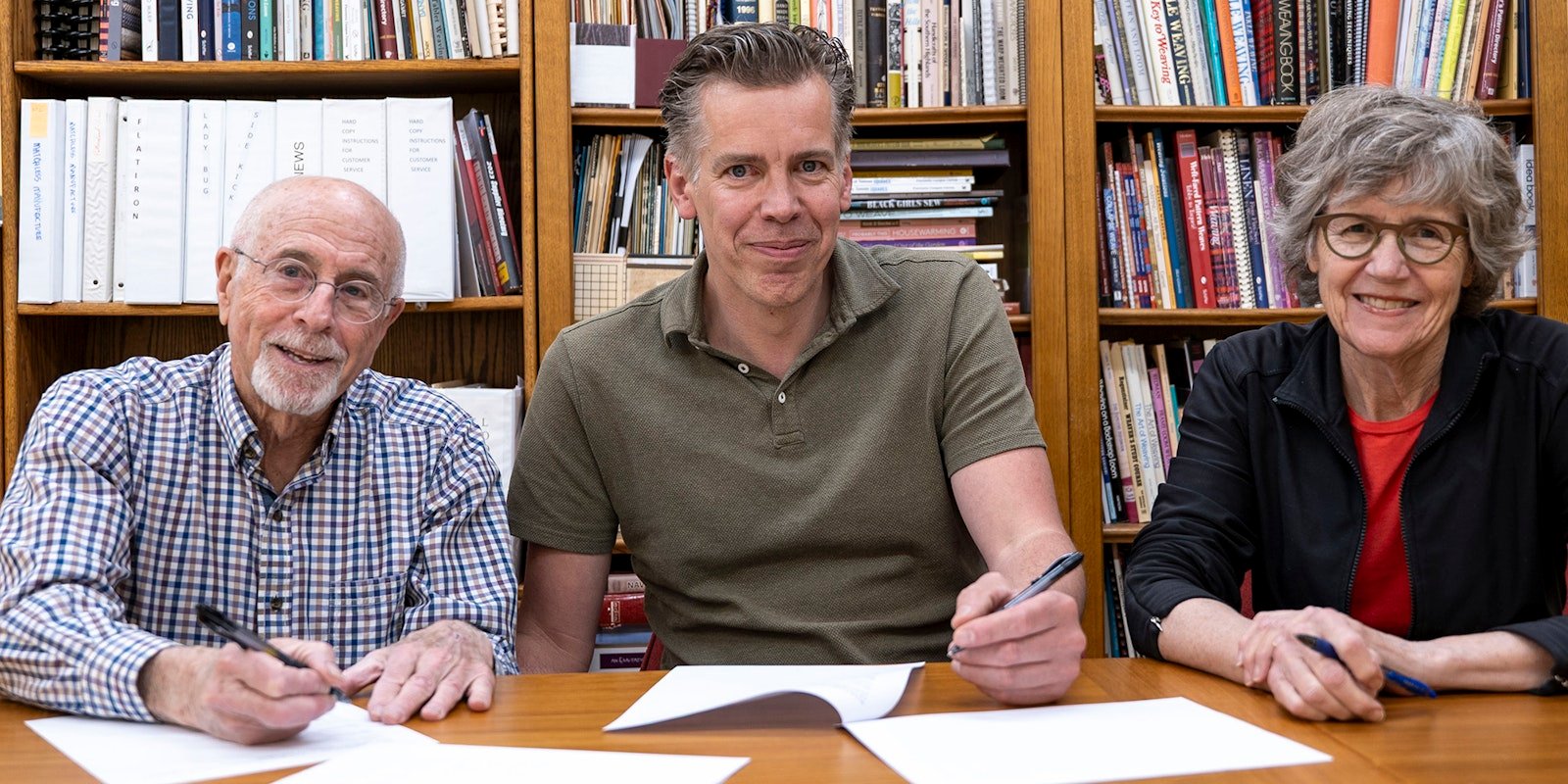In a surprise to the craft industry, Netherlands-based Louët B.V. purchased Colorado-based Schacht Spindle Co. in May 2025. The companies, which each celebrated their 50th anniversary in recent years, both build and sell broad lines of widely respected weaving looms, spinning wheels, and accessories.
Earlier in the year, Louët purchased the fiber company Venne B.V., also based in the Netherlands. Venne’s products include a range of high-quality cotton, wool, silk, and linen yarns, as well as its Eco Jeans recycled yarn.
Louët’s first product, released in 1974, was a spinning wheel. Multishaft looms were not far behind, starting with the W70, and moving on to the Hollandia, David, Spring, Magic Dobby, Megado, Jane, and their new Harmony. Modern styling and materials such as Teksolv heddles and engineered wood are hallmarks of Louët products.
Meet Paul Vervoorn, Schacht’s New Owner
Paul Vervoorn began his career at Louët from the ground up—literally. When he was about 5 years old, Paul started pushing a broom around the production floor with the company’s cleaning crew. His father, Theo Vervoorn, had joined Louët as a business manager and then became part-owner alongside founders Jan Louët Feissner and Clemens Claessen.
As an adult, Paul designed products for a time in the dental industry, and then returned to run Louët’s machine shop. At his father’s suggestion, Paul approached the owners of Louët about seven years ago to purchase the company. The transfer was slow, but three years ago the sale was complete.
His work experience prepared him for the product design and production process upgrades he’s been working on at Louët. He brought in new CNC equipment, which led to dramatic production increases and cost declines. Order backlogs that used to be 8 to 10 weeks have been mostly eliminated.
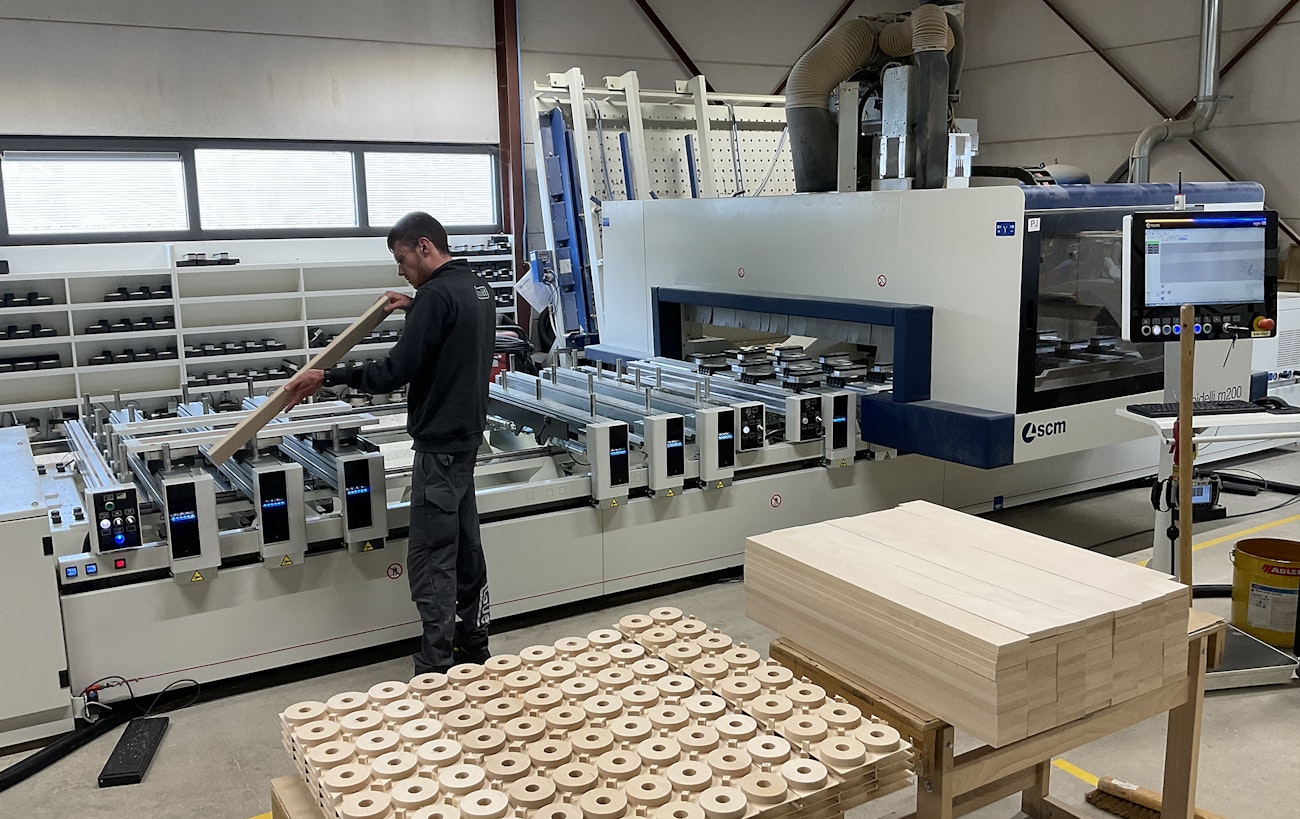 New CNC equipment at Louet resulted in production increases and cost declines. Photo courtesy of Louët
New CNC equipment at Louet resulted in production increases and cost declines. Photo courtesy of Louët
Paul wants to grow the company by reaching more customers in the U.S. and around the world. The eye-catching styling (and low pricing) of Louët’s new Harmony loom are meant to appeal to younger generations of weavers. And the recent purchases of Venne and Schacht are part of his growth plan.
Schacht’s Long History
Schacht Spindle Company was founded by brothers Barry and Dan Schacht during the back-to-earth movement of the late 1960s. As you might have guessed from the company’s name, their first product was a drop spindle—but a portable tapestry loom quickly followed.
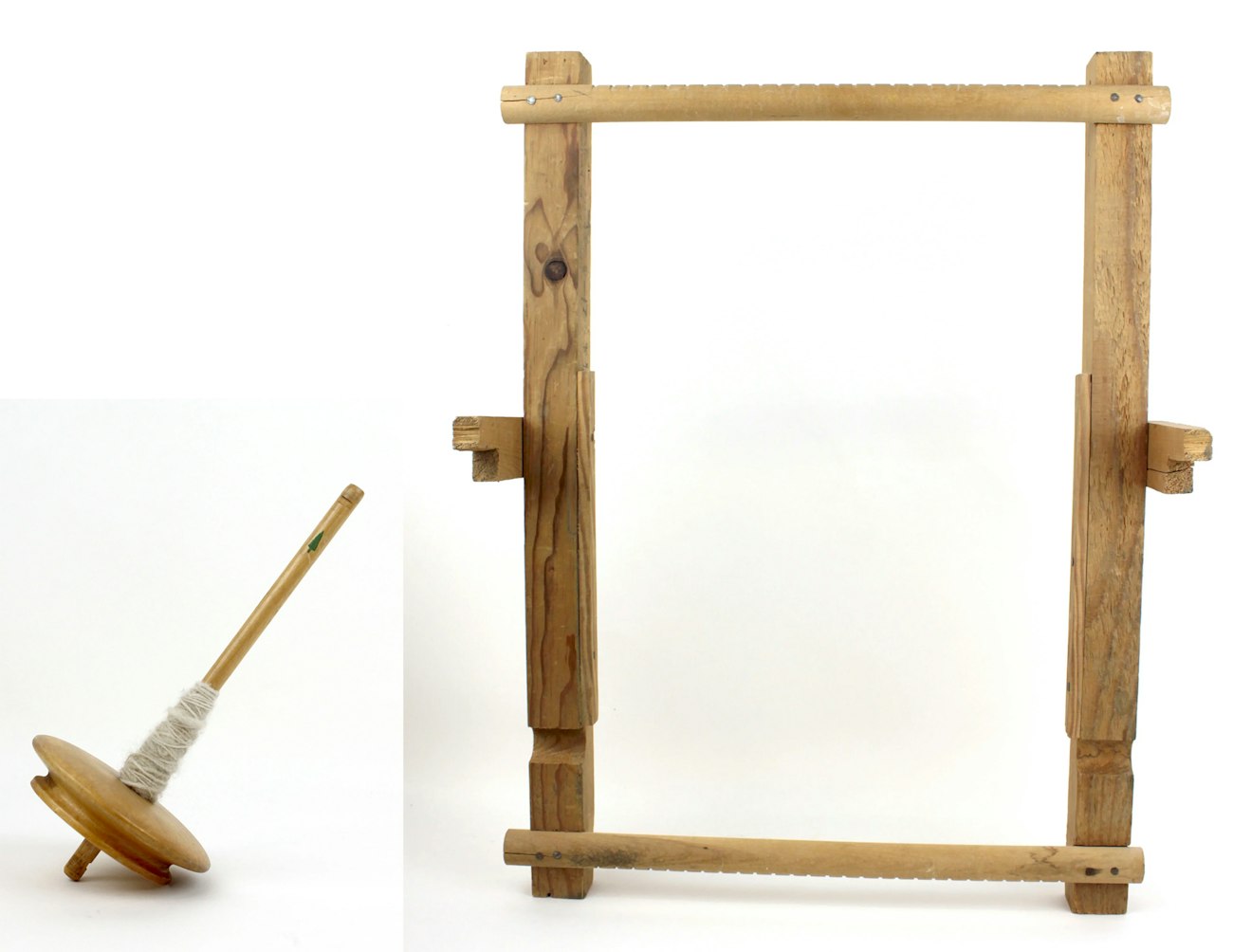 Schacht’s first products—a drop spindle and portable tapestry loom. Photos courtesy of Schacht
Schacht’s first products—a drop spindle and portable tapestry loom. Photos courtesy of Schacht
Over the years, Schacht designed and produced a broad range of spinning wheels and looms (from multishaft to rigid heddle, tapestry, frame, inkle, and even pin), all built in their Colorado shop and with a hardwood-forward aesthetic. In the early days, products were produced using traditional woodworking production tools and methods. About 30 years ago, the company invested in CNC machines to automate production.
Many of Schacht’s employees are spinners and weavers themselves, so they bring a deep-rooted understanding of the crafts to the work they do.
You’d be hard-pressed to find a multishaft weaver in the U.S. who hasn’t woven at least a few picks on one of the Wolfs (Mighty, Baby, or Pup), and customers are enthusiastic about the generous product support Schacht provides, even years after a purchase.
Reflecting recently about what the company accomplished over its long history, owner Barry Schacht said, “This is really important. We weren’t just building looms, we were building weavers. Teaching was always key.”
But Barry felt that it was time to retire. He and Paul struck up a friendship at Convergence 2024 in Wichita, they spent some time together, and they eventually came to an agreement about joining forces.
Why did Barry sell Schacht to Louët specifically?
“It has a young owner who grew up in the business,” he said. “He’s a good designer and manufacturer, and he understands modern machinery,” which Barry believes means that Paul is well-positioned to keep Schacht healthy and growing.
“There’s no better buyer.”
All Together Now
After meeting Barry in Wichita, Paul realized that the chance to buy Schacht, a company with great influence in the spinning and weaving world, was a once-in-a-lifetime opportunity—so he quickly moved forward with the sale.
“If you don’t seize it now it’s not going to ever come again,” he said. “Now we’ve got a lot of work in front of us to get these three companies really working well.”
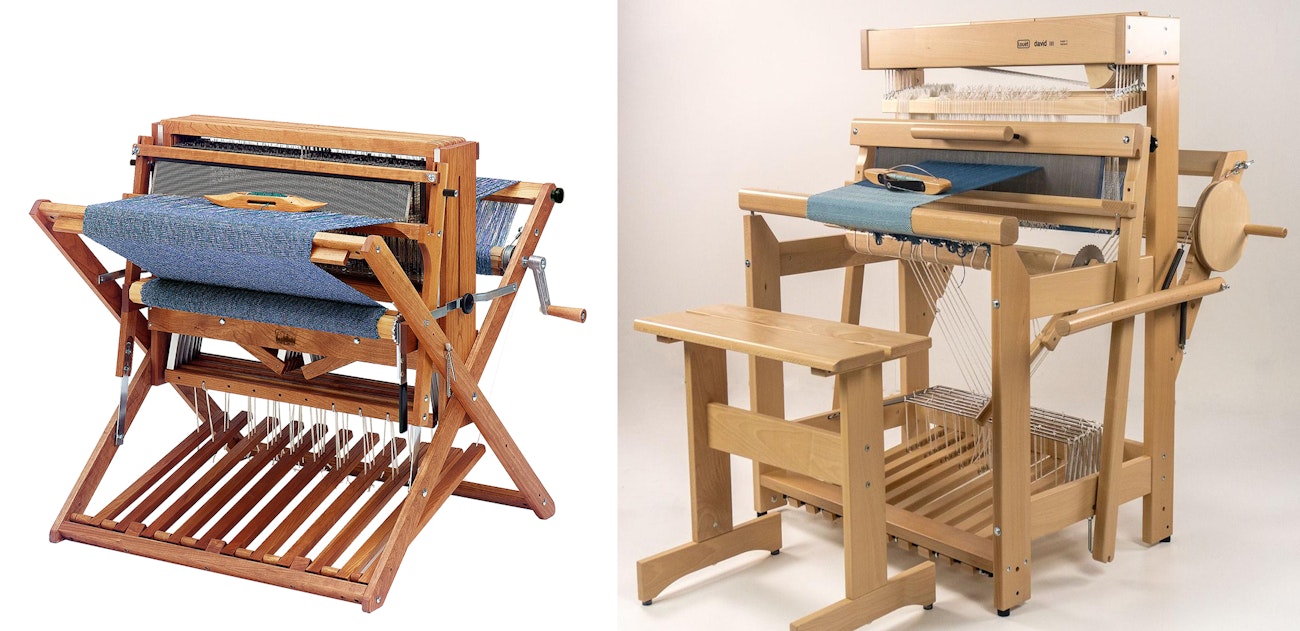 The distinctly different look and feel of products made by the two brands is evident in the Schacht Baby Wolf (left) and Louët David III (right). As Paul designs for both companies, he‘ll maintain that difference in style. Photos courtesy of Schacht and Louët
The distinctly different look and feel of products made by the two brands is evident in the Schacht Baby Wolf (left) and Louët David III (right). As Paul designs for both companies, he‘ll maintain that difference in style. Photos courtesy of Schacht and Louët
Paul and his team plan to maintain and develop both of the Louët and Schacht production facilities and product lines, keeping the brands distinct and with their individual styles. He sees opportunities ahead to improve production processes and business functions that aren’t visible to customers. (Here’s one example of the type of question they’re considering: Can we fit the Mighty Wolf in a smaller box while keeping it safe from shipping damage?)
His first big order of business at Schacht is to work on production efficiencies, and then to replace their aging CNC machines with new versions—with a goal of building up inventory and eliminating their current six- to eight-week order backlog.
The new CNCs will be similar to Louët’s, which may help them improve production on both sides of the Atlantic. They’ll be testing whether design files can be sent to both facilities, allowing work to shift back and forth as needed.
The next step will be product development for both brands—starting with improvements to existing models, and then moving on to new products and product lines. In fact, workers at Schacht have a shelf full of pent-up product ideas ready to explore. One recent new product with broad appeal is Louët’s new ball winder, and there are exciting weaving products for both brands slated for release within the next year or so.
Paul will do all the design work for both brands, while keeping their distinct styles in mind. While that equipment may share some functional elements, Schacht and Louët products will retain their distinct look and feel.
Support and More
Customers of both companies have always relied on them to provide support and replacement parts for products that may be decades old. While this broad assistance is very popular with weavers and spinners, it’s a substantial strain on the companies in both time and money. A long-term issue for Paul will be figuring out how to maintain robust customer support while making the process of providing it easier. As a starting point, new software will use the CNC design files to track model specs and their changes over time. Serial numbers may be added to more products, making support questions easier to answer and spare parts easier to identify and track down.
Looking ahead, the Louët brand will tap into the deep spinning and weaving knowledge that has made Schacht so strong in marketing and education.
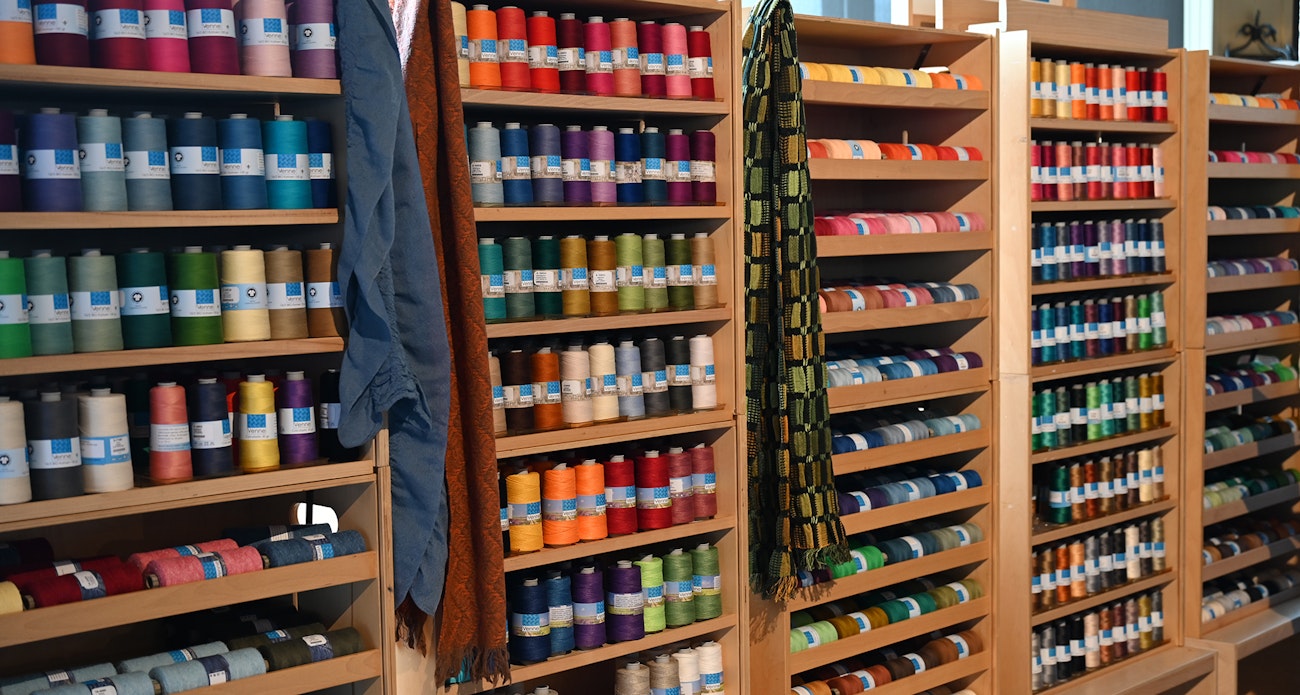 Venne yarns will eventually be offered in kits with Schacht’s patterns, and at Louët and Schacht retailers around the world. Photo by Long Thread Media
Venne yarns will eventually be offered in kits with Schacht’s patterns, and at Louët and Schacht retailers around the world. Photo by Long Thread Media
Let’s not forget about Venne. Paul would like to offer kits using Schacht’s large pattern library and Venne yarns. And he’d eventually like their retailers to offer Louët, Schacht, and Venne products around the world.
Right at this moment, tariffs and low consumer confidence are affecting Louët sales in the U.S. Paul is open to building Louët products in America to ease dealer and customer concerns about tariff costs—and Schacht’s new CNCs will make that possible.

